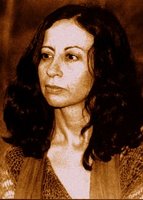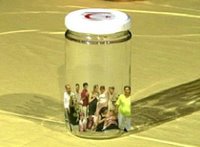In Her Own Words: Neshe Yashin
Ms. Yashin, who is 47, is a Turkish Cypriot poet who teaches at the University of Cyprus, on the Greek side of the island. She has published five books of poetry and one novel, all in Turkish. Her work has been translated and published on the Greek side of Cyprus, in Greece, Turkey, the United Kingdom and elsewhere. She’s best known for her poem, “Which Half?” Ms. Yashin made history in February, 2006 when she declared her candidacy for parliament in the Greek part of the island, which is officially called the Republic of Cyprus. She is the first Turkish Cypriot to run for parliament in the Republic since the Turkish Cypriots left the government in 1963.
tCr: How has the easing of travel restrictions changed communication between the two sides?
Yashin: Cyprus Broadcast, the state-sponsored TV station, now has a dual-language program, which is called Biz in Turkish and Emis in Greek. The title means “We.” You can see it on both sides of the island. When they have a guest speaking Greek there are Turkish subtitles, and when they have a guest speaking Turkish there are Greek subtitles. It started about two years ago, just after the opening of the border. They employ some young Turkish Cypriot journalists, who live in the north and travel to the south for work. So they could not have done this before the border opened.
tCr: How else do people get their news?
Yashin: Turkish Cypriots read a lot of newspapers. The main newspapers published in the north are Kibris and Yeniduzen, but there are also newspapers from Turkey. Of course, now many people follow news on the Internet. Greek Cypriots usually buy their political party newspapers, in addition to the two main independent newspapers in the south, Politis and Fileleftros.
Radio political talk shows were also very popular before the referendum. People called in a lot. It was unbelieveable. Old housewives were calling in and making very specific political comments. I was a guest several times on these shows. During the Annan Plan, it was like people were not even sleeping, because they were watching the news until late at night. But interest has decreased since the referendum failed. People lost their hope.
tCr: And now the level of interest in political talk shows has gone back to what it was before the Annan plan?
Yashin: I think since the referendum failed there is less interest than before.
tCr: Which literary themes are popular in Cyprus?
Yashin: The novel I Magisses Tis Simirnis (Magicians of Izmis), by Mara Meimaridis, a Greek anthropologist, is popular on both sides of the island. It takes place during the Ottoman Empire. It’s about Greek women and the kind of magic they use, and it’s very enjoyable to read. The book was written in Greek and translated into Turkish.
The Turkish Cypriot newspaper compiles two best seller lists by talking to local bookshops. One list for books from abroad—and of course these are the The Da Vinci Code, and books like that—and one for local authors, either Turkish or Greek Cypriots. For instance, my books are published in Turkey, but they make the list because I am a local author. And when Greek Cypriot books are translated into Turkish, most of the time they are on top of the list. Usually they translate books by Greek Cypriots on The Cyprus Problem. These are always the most popular.
Of course, Cypriots are always interested in books written on the Cyprus problem. Niyazi Kizilyurek, president of the Turkish Studies department at the University of Cyprus, wrote a book called Doğmamış Devletin Tarihi (History of an Unborn State). He is a Turkish Cypriot like me who’s living on the Greek side. His book deals with the historical political reasons behind why a united state was not created, and why we failed in the referendum. On the Greek side, there is I Skotini Opsi Tis EOKA (EOKA: The Dark Direction) by Makarios Drussiotis. It is a history of EOKA. I think it will be popular in the northern half of the island once it is published in Turkish. (NOTE: EOKA stands for Ethniki Organosis Kyprion Agoniston, a Greek Cypriot paramilitary group that was originally formed to fight British rule. For more context, read tCr's glossary. The book Ms. Yashin mentioned was published in Turkish shortly after our interview last summer, and did immediately make the local best-seller list on the Turkish side of the island.)
tCr: How do Cypriots buy books?
Yashin: On the Greek side, I’ve heard that the Ministry of Culture promotes local authors by sending their books to a list of people, who send money once they receive the books. On the Turkish side, there is an annual book fair in August. It is organized by Isik, a local bookshop. They invite writers to speak, and since the opening of the border, they invite a lot of Greek Cypriots who have books translated into Turkish.
tCr: You’ve been teaching at the main university on the Greek side of Cyprus since before it became easier to travel between both sides in 2003. Has that changed university life at all?
Yashin: I teach Turkish Cypriot literature in English, using Turkish texts in translation. My students are all Greek Cypriots. I don’t have any Turkish Cypriot students, and there are very few in the University. The problem is that the courses at the university are almost all taught in Greek. When the Turkish Cypriot students apply, they ask them to learn Greek. This has to change actually, because Greek and Turkish are the official languages of the Republic. But this is a new situation.
tCr: You mean since the travel restrictions were eased in 2003?
Yashin: Exactly, because it was not accessible to Turkish Cypriot students before that, but now it’s possible for them to study there.
tCr: So Greek is the official language of the university?
It’s not the official language, but the lessons are in Greek. I also use Greek in my classes, but my Greek is not very good, and sometimes I bring in Turkish Cypriot literature that has been translated into Greek, so they can read it better. The students have a level of English, but Greek is still their mother tongue.
tCr: Have you noticed a difference between the reading habits of older Cypriots—both Greek and Turkish—who would remember 1974, and your students, who are presumably too young to remember those events?
Yashin: Yes, I think the older generation is more interested in reading about the Cyprus problem. I also think there is a difference between the reading habits of Turkish Cypriot youth and Greek Cypriot youth. I think Turkish Cypriot youth is more politicized.
tCr
(First photo courtesy of Ms. Yashin. Second and third photos courtesy of CBTV.)









